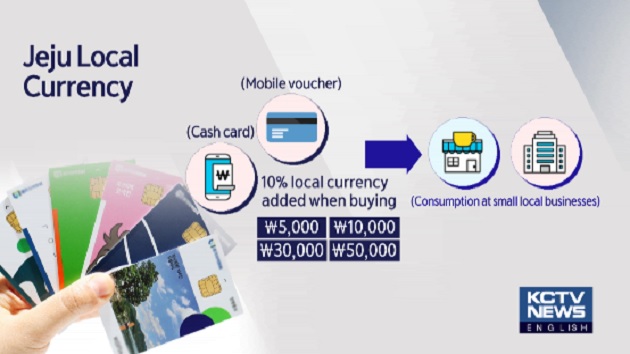
Jeju Island’s own currency, which can be used at small local businesses, will be launched in October.
The currency will be distributed in the form of a debit card or a mobile voucher.
The province is encouraging residents to use the local currency by offering more value than the actual amount of money charged.
Meanwhile, concerns are being raised by business owners about the list of eligible businesses.
Joseph Kim reports.
Three kinds of public vouchers are used in Jeju:
The Jeju Love Voucher issued by the local merchant association, the Farming Village Love Voucher issued by the National Agricultural Cooperative Federation and the (온누리) Onnuri Voucher issued by the national government.
In total, 56 billion won worth of vouchers are circulated in Jeju per year.
The range of use is set differently by voucher.
It has been pointed out that there is no local voucher issued by the provincial government where Seoul can send national funds.
The province is planning to issue the island's own currency.
It will encourage residents to use the local currency by giving an additional 10 percent discount when buying the local currency.
The currency can be charged onto a cash card or issued as mobile vouchers and used at local small businesses.
5,000 won, 10,000 won, 30,000 won and 50,000 won of the local currency will be issued.
The province will issue 20 billion won worth of the local currency in October, 150 billion won worth next year and 200 billion won in 2022.
About 97,000 small businesses in Jeju will accept the new local currency, which is expected to boost consumption at those local businesses.
Confusion seen when the national emergency relief fund was distributed in cash would be resolved.
Meanwhile, controversy is being raised among business owners on the range of use of the local currency.
According to the province's plan, the local currency will not be accepted at bars, pubs, gambling places and game rooms, as well as big supermarkets and shops directly managed by company headquarters located on the mainland.
Local small business owners requested that the province limit the use of the currency also at Hanaro Mart run by the National Agricultural Cooperative Federation, saying that sales increases at Hanaro Mart across the island have been reported when national emergency relief funds were distributed.
Coordination of opinions among the involved businesses is becoming the biggest issue on the new currency, while the province is working on interlocking national funds including emergency relief funds and children’s allowances with the local currency.
Joseph Kim, KCTV





